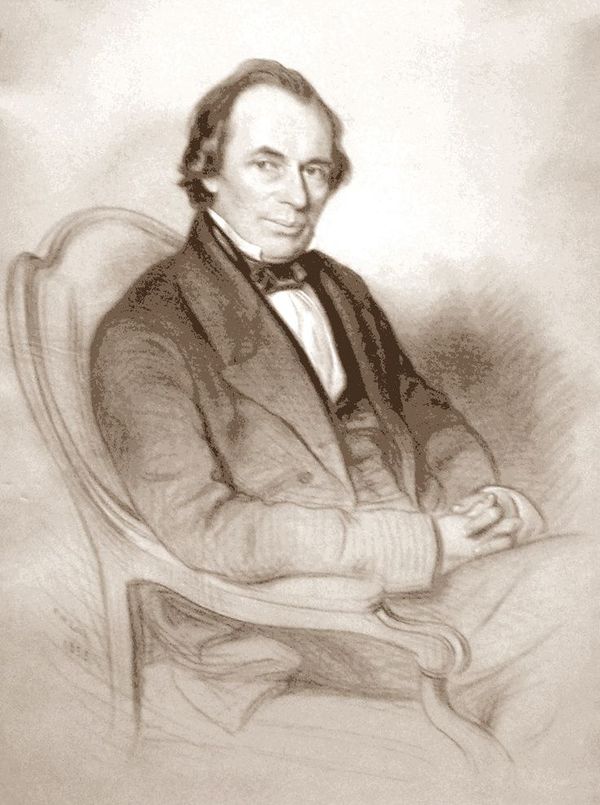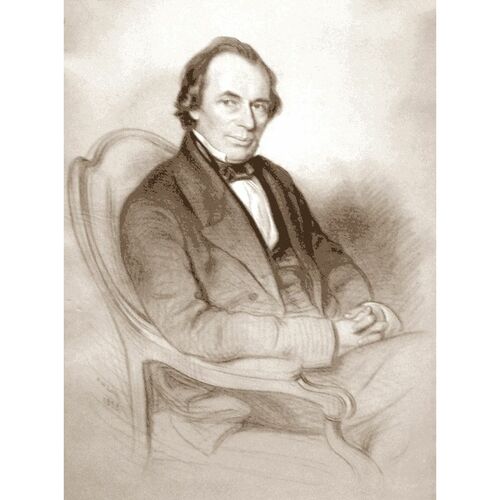
Source: Courtesy of Wikimedia Commons
BUELL, ANDREW NORTON, lawyer, businessman, politician, journalist, and office-holder; b. 20 April 1798 at Elizabethtown (Brockville), U.C., the second son of William Buell*, loyalist and founder of Elizabethtown, and Martha Naughton; d. 9 Nov. 1880 at Toronto, Ont.
Andrew Norton Buell was educated at Pointe-Claire, Lower Canada (where he acquired a fluency in French), and at Brockville, Upper Canada. In 1816 he became a student-at-law and clerk in the office of David Jones of Brockville. He was admitted to the bar of Upper Canada on 6 Nov. 1821 as a barrister and attorney-at-law, and solicitor in chancery.
Beginning in 1821 Buell undertook an active career in journalism and politics on behalf of the Reform cause. He was instrumental in the founding of the Reform-oriented Brockville Recorder, and contributed the introductory address which appeared in the first number in 1821. Two years later he negotiated the purchase of the Recorder by his elder brother William*, who remained its editor and publisher for 28 years. Andrew Norton contributed innumerable editorials, communications, and addresses to its pages.
Buell was prominent locally in temperance societies and in the militia, but in politics he concentrated most of his efforts on behalf of his brother William who was elected to the Upper Canadian House of Assembly in 1828, 1830, and 1836. Local tradition has it that A. N. Buell was the first politician to organize a regular Reform political convention in Upper Canada as a means of securing the election of sympathetic candidates. During the 1825–37 period he carried on an active correspondence with other leading Reformers, such as Marshall Spring Bidwell, William Lyon Mackenzie*, and Robert Baldwin*. He was also instrumental in drawing up several bills which brought about local reforms; one was a law allowing polls to be held at four locations in Leeds, supplanting the single poll which could be dominated by the Orange and Tory supporters of Ogle Robert Gowan and Robert Sympson Jameson*. Both were unseated in 1835 as a result of their supporters’ violence in the election of 1834.
Because of his political activity, Buell neglected both his business interests and his law practice to such an extent that in 1836 he was forced to undertake canal building contracts in New York State in hopes of recouping his fortunes. Thus he was living there when the Upper Canadian rebellion occurred in December 1837. Buell returned to Brockville in 1840 and was charged with treason by Gowan, his political enemy of long standing. He was able to clear himself only by obtaining numerous affidavits to his innocence. Equally distressing to Buell, the canal contracts had proven unprofitable with the result that he was forced to sell most of his patrimony to settle his debts, and finally had to apply for a government position to support his family.
Robert Baldwin, recognizing Buell’s efforts on behalf of the Reform cause, appointed him registrar of Johnstown District (Leeds and Grenville counties) in 1842, a position he held until 1849. In 1849 he was offered two judgeships by Baldwin, but was forced to decline because of deafness. Instead, he was made clerk of the crown and pleas in the Court of Common Pleas, and registrar of the Court of Chancery at Toronto. In 1850 he became master in chancery, a position that he filled with distinction for 20 years. In 1870 he became accountant-general in chancery, from which position he retired in 1878 to his farm at Brockville. He died at Toronto two years later.
Buell was twice married, to Calcina Richards of Brockville, then to Ann Eliza Thorp. There were four daughters and two sons from his first marriage and no issue from his second.
MTCL, Baldwin papers, especially vols. 36, 64, 68, 73, 78. PAO, Harry D. Blanchard papers; A. N. Buell papers; Cartwright family papers; Frederick John French collection; Sir James R. Gowan and Ogle R. Gowan papers; Solomon Jones papers; Mackenzie-Lindsey collection; James Reynolds papers; Frederick Peter Smith collection. Ruth McKenzie, Leeds and Grenville: their first two hundred years (Toronto and Montreal, 1967), 65, 68, 120–21, 153. G. R. I. MacPherson, “The code of Brockville’s Buells,” unpublished ma thesis, University of Western Ontario, 1966.
Cite This Article
Leo A. Johnson, “BUELL, ANDREW NORTON,” in Dictionary of Canadian Biography, vol. 10, University of Toronto/Université Laval, 2003–, accessed December 31, 2025, https://www.biographi.ca/en/bio/buell_andrew_norton_10E.html.
The citation above shows the format for footnotes and endnotes according to the Chicago manual of style (16th edition). Information to be used in other citation formats:
| Permalink: | https://www.biographi.ca/en/bio/buell_andrew_norton_10E.html |
| Author of Article: | Leo A. Johnson |
| Title of Article: | BUELL, ANDREW NORTON |
| Publication Name: | Dictionary of Canadian Biography, vol. 10 |
| Publisher: | University of Toronto/Université Laval |
| Year of publication: | 1972 |
| Year of revision: | 1972 |
| Access Date: | December 31, 2025 |



